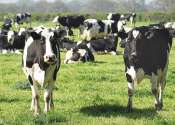Research shows heat, drought and fire risk are increasing in South America
The number of days per year that are simultaneously extremely hot, dry, and have a high fire risk have as much as tripled since 1970 in some parts of South America.

The number of days per year that are simultaneously extremely hot, dry, and have a high fire risk have as much as tripled since 1970 in some parts of South America.
Earth Sciences
18 hours ago
0
30

At a tranquil nature reserve in South Michigan, an Agricultural Research Service (ARS) scientist and her collaborators connected olden wild bee sample collections and modern technology to better decode the ecological traits ...
Plants & Animals
Sep 25, 2024
0
58

The most comprehensive scientific review of the global nitrogen cycle has outlined 150 "win-win" measures to significantly reduce nitrogen pollution while saving billions in costs across a range of industries.
Environment
Sep 25, 2024
0
34

During missions into outer space, galactic cosmic radiation (GCR) will penetrate current spacecraft shielding and thus pose a significant risk to human health.
Space Exploration
Sep 25, 2024
0
1

Genetically modified (GM) crops are widely used around the world, but their effects on the environment need to be better understood.
Biotechnology
Sep 24, 2024
0
1

A Mississippi State biologist's research in improving global nutrition and sustainability is featured this week in New Phytologist.
Biotechnology
Sep 24, 2024
0
13

Many human activities lead to methane being released into the atmosphere. Agriculture, landfills, wastewater, and fossil fuel production and distribution are the biggest contributors. These make up roughly 60% of global methane ...
Environment
Sep 23, 2024
0
4

More than 3,600 chemicals used in food packaging or preparation have been detected in human bodies, some of which are hazardous to health, while little is known about others, a study published on Tuesday said.
Environment
Sep 17, 2024
0
63

Scientists have found a way to create artificial sugars that could lead to better ways to diagnose and treat diseases more accurately than ever before.
Biotechnology
Sep 13, 2024
0
1

CABI has played a leading role in the creation of a new report, facilitated by the National Biofilms Innovation Centre (NBIC), which is calling for a "highly ambitious enterprise" to create a microbiome biobank that will ...
Cell & Microbiology
Sep 11, 2024
0
18
At the time of the creation of the World Health Organization (WHO), in 1948, Health was defined as being "a state of complete physical, mental, and social well-being and not merely the absence of disease or infirmity".
This definition invited nations to expand the conceptual framework of their health systems beyond issues related to the physical condition of individuals and their diseases, and it motivated us to focus our attention on what we now call social determinants of health. Consequently, WHO challenged political, academic, community, and professional organisations devoted to improving or preserving health to make the scope of their work explicit, including their rationale for allocating resources. This opened the door for public accountability [3].
Only a handful of publications have focused specifically on the definition of health and its evolution in the first 6 decades. Some of them highlight its lack of operational value and the problem created by use of the word "complete." Others declare the definition, which has not been modified since 1948, "simply a bad one." [4]. More recently, Smith suggested that it is "a ludicrous definition that would leave most of us unhealthy most of the time." [5].
In 1986, the WHO, in the Ottawa Charter for Health Promotion, said that health is "a resource for everyday life, not the objective of living. Health is a positive concept emphasizing social and personal resources, as well as physical capacities." Classification systems such as the WHO Family of International Classifications (WHO-FIC), which is composed of the International Classification of Functioning, Disability, and Health (ICF) and the International Classification of Diseases (ICD) also define health.
Overall health is achieved through a combination of physical, mental, emotional, and social well-being, which, together is commonly referred to as the Health Triangle.
This text uses material from Wikipedia, licensed under CC BY-SA